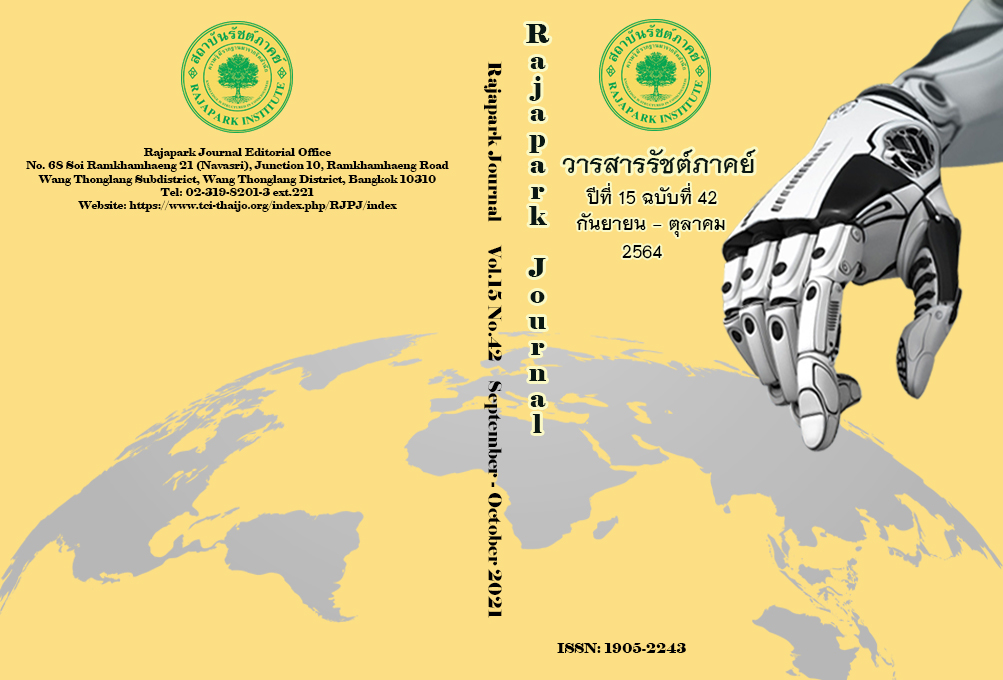Civic Culture Administration to Push Forward Identity Ethnic of ‘Tai Song Dum’ in Thailand
Main Article Content
Abstract
This study is intended for the administration of citizen culture to drive factors that cause change and to study the ways to drive and maintain the identity of the Thai Song Dam ethnicity to be strong and sustainable. use a qualitative study of key informants involved. A total of 30 people were interviewed, and the tools used were an in-depth interview, structured interview form, and an observation form. The data was analyzed by content analysis. The results of the research were as follows: 1) Citizenship culture management in driving the identity of the Black Thai ethnicity in Thailand is currently systematic and orderly power management. There are different social positions and powers. 2) Factors causing this change in ethnic identity include the advancement of science and technology, the influence of the media. social media, immigration, educational progress, occupation, accepting culture from people outside the area, 3) Guidelines for driving and maintaining the Thai Song Dam ethnic group's strong and sustainable identity, including promoting and supporting activities by the government and related agencies, as well as activities on the part of the Thai Song Dam ethnic group. They must instill in their children a sense of love and pride in their ethnicity. especially traditions and cultures in rituals, language, and dress.
Article Details
Views and opinions appearing in the Journal it is the responsibility of the author of the article, and does not constitute the view and responsibility of the editorial team.
References
Ardsamiti, N. (2012). State of Nation, Ethnicity and Identity of Thai Song Dam. Journal of Sociology and Anthropology, 31(2), 127-150.
Burusphat. S. (1999) The Status of Linguistic Research in Thailand: A Study of Text-Level Languages and Pragmatic Linguistics. Journal of Language and Culture, 18(2), 11-22.
Bunyaratphan, S. (2006). People and Good Governance: A Survey of Attitudes of Thai People in the North and Northeastern Region. Bangkok: National Institute of Development Administration.
Chanchai, M. (2017). Citizenship to The Management of Their Communities Thailand. The National Defence College of Thailand Journal, 59(1), 77-95.
Chunsong, S., Dockthaisong, B., Banchirdrit, S., & Sriharan, B. (2016). The Development of Social Capital to Establish a Strong Communities. Journal of Humanities and Social Sciences Valaya Alongkorn, 10(3), 273-283.
Chantavanich, S. (2011). Sociological Theory (4th ed.). Bangkok: Chulalongkorn University.
Chanwanakul, S., & Honghengseng, K. (2020). The Effectiveness of Interpretation of Giant Displays in Suvarnabhumi Airport, Thailand. Institute of Culture and Arts Journal Sirinakharinwirot University, 22(1), 99-111.
Denhardt, J. V., & Denhardt, R. B. (2007). The New Public Services (Expanded Edition): Serving not Steering. Armonk, New York: M.E. Sharpe.
Fakao, S. (2010). Maintaining the Cultural Identity of the Tai Yai Community through Transitions in Mae Hong Son Province. Bangkok: Department of Cultural Promotion, Ministry of Culture.
Fine Arts Department. (1999). Local Wisdom and Technology. Bangkok: Fine Arts Department.
Government Gazette. (2017). Constitution of The Kingdom of Thailand 2017. Bangkok: Constitution Drafting Committee Office of the Secretariat of the House of Representatives.
Institute of Public Policy Studies [IPPS]. (2008). Citizen Culture. Retrieved form http://www.fpps.or.th/news.php?detail=n1227963397.news
Janpla, J., Songsuwong, W., Kijkar, P., & Wongsaming, S. (2016). Development of Thai Song Dam Woven Fabric Products to Add Value Following the Creative Economy Concept. Veridian E-Journal, Silpakorn University, 9(2), 82-98.
Jittaruttha, C. (2016). Organizational Culture: Thai Local Government Organizations and Determinants of Cultural Success (2nd ed.). Bangkok: Chulalongkorn University.
Jittaruttha, C. (2017). Organizational Culture: Factors for Sustainable Success (3rd ed.). Bangkok: Chulalongkorn University.
Phothisita, C. (2019). Science and Art of Qualitative Research (8th ed.). Bangkok: Amarin Printing and Publishing.
Prasertkul, S. (2009). State of Nation, Ethnicity and Modernity. Bangkok: Thammasat University.
Rattanaset, W. (2014). Citizen Public Administration. King Prajadhipok's Institute Journal, 12(3), 5-20.
Royal Academy. (1996). The Royal Institute's Dictionary of English-Thai Sociology Terms. Bangkok: The Royal Institute.
Siriprakob, P. (2017). 3 Paradigms in Public Administration: Concepts, Theories, and Practical Applications (3rd ed.). Bangkok: Chulalongkorn University.
Srimarat, T. (2015). Cultural identity and the process of becoming a commodity: a case study of Ping Nakara Boutique Hotel and Spa Chiang Mai. Chiang Mai: Chiang Mai University.
Sriram, N., Kiatwatcharachai, K., & Charanchai, C. (2013). Synthesis of New Concepts of Public Service. Nonthaburi: Sukhothai Thammathirat Open University.
Tantisunthorn, T. (2014). Citizenship, Human Rights and Democracy. Bangkok: Institute of Public Policy Studies [IPPS].
Thongkaew, K. (2018). Social Practices and New Rules of Tai Song Dam Ethnic in Suratthani Province. Program in Social Studies, Faculty of Education, Suratthani Rajabhat University.


